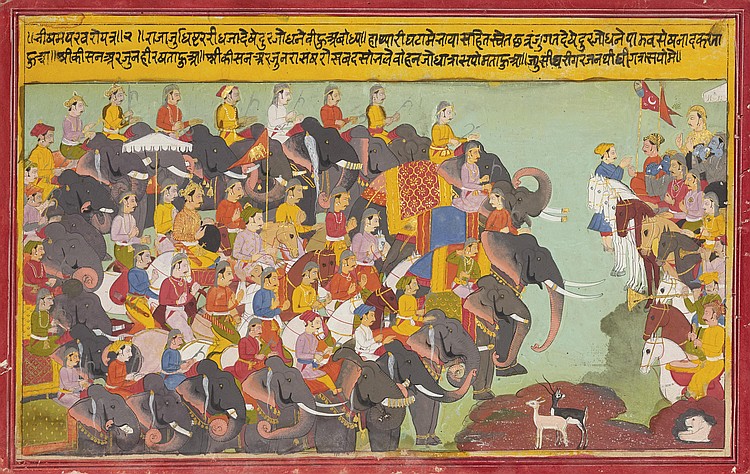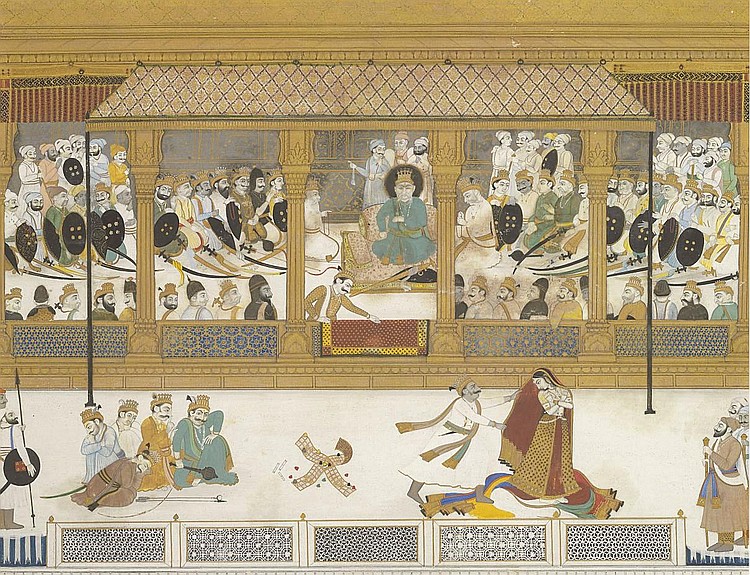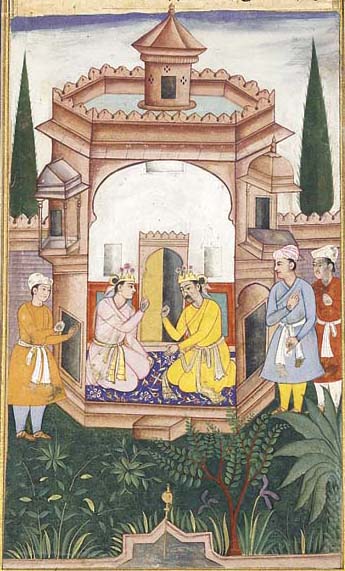|
Dhritarashtra
Dhritarashtra () was a ruler of the ancient Kuru kingdom, featured as a central character in the Hindu epic ''Mahabharata''. He is also attested in the ''Yajurveda'', where he is acknowledged as the son of King Vichitravirya. According to the ''Mahabharata'', Dhritarashtra’s birth was the result of the ancient practice of ''Niyoga''. After Vichitravirya died childless, his half-brother Vyasa fathered children with Vichitravirya’s widows to continue the Kuru lineage. Dhritarashtra was born blind to Vichitravirya’s elder queen, Ambika. Despite being the eldest, his blindness disqualified him from inheriting the throne, which passed to his younger half-brother, Pandu. However, after Pandu renounced the throne and retired to the forest, Dhritarashtra assumed kingship of the Kuru kingdom, albeit as a nominal ruler heavily influenced by his grandsire, Bhishma, and his eldest son, Duryodhana. Dhritarashtra married Gandhari, a devoted wife who, in a gesture of solidarity, ... [...More Info...] [...Related Items...] OR: [Wikipedia] [Google] [Baidu] |
Gandhari (Mahabharata)
Gandhari (, ) is a prominent female character in the ancient Hindu epic ''Mahabharata''. She is the daughter of King List of characters in the Mahabharata#Subala, Subala, the ruler of Gandhara kingdom, Gandhara, and becomes the wife of Dhritarashtra, the blind king of Kuru kingdom, Kuru Kingdom. In a remarkable act of solidarity, Gandhari blindfolds herself for life upon learning of her husband's blindness, choosing to share his condition. Blessed by the god Shiva and the sage Vyasa, she bears one hundred sons through Miraculous births, miraculous means, collectively known as the Kauravas, with her eldest, Duryodhana, becoming a key antagonist in the epic. Besides her hundred sons, Gandhari also has a daughter, Dushala. Her brother, Shakuni, becomes a central figure in aiding Duryodhana's schemes against his cousins, the Pandavas. Gandhari is portrayed as a woman of great virtue and moral strength, who nonetheless struggles to dissuade her sons from their destructive path. She ... [...More Info...] [...Related Items...] OR: [Wikipedia] [Google] [Baidu] |
Duryodhana
Duryodhana (, Help:IPA/Sanskrit, [d̪ʊɾjoːd̪ʱən̪ᵊ], ), also known as Suyodhana, is the primary antagonist in the Hindu epic ''Mahabharata.'' He is the eldest of the Kaurava, Kauravas, the hundred sons of King Dhritarashtra and Queen Gandhari (Mahabharata), Gandhari of Kuru dynasty. Born through a miraculous manner, his birth is accompanied by ill-omens. Duryodhana grows up in Hastinapur, Hastinapura and later becomes its crown prince. Driven by innate selfishness, jealousy, and hostility towards his cousins—the five Pandava brothers—Duryodhana frequently plots against them, aided by his principal allies: his trickster uncle Shakuni, his loyal friend Karna, his devoted brother Dushasana and his blind and indulgent father Dhritarashtra. Duryodhana's envy culminates in the infamous dice game, where he humiliates Draupadi, the queen of the Pandavas. This incident provokes Bhima, the second Pandava, to vow that he will one day smash Duryodhana's thigh. Later, with the he ... [...More Info...] [...Related Items...] OR: [Wikipedia] [Google] [Baidu] |
Mahabharata
The ''Mahābhārata'' ( ; , , ) is one of the two major Sanskrit Indian epic poetry, epics of ancient India revered as Smriti texts in Hinduism, the other being the ''Ramayana, Rāmāyaṇa''. It narrates the events and aftermath of the Kurukshetra War, a war of succession between two groups of princely cousins, the Kauravas and the Pandava, Pāṇḍavas. It also contains Hindu philosophy, philosophical and devotional material, such as a discussion of the four "goals of life" or ''puruṣārtha'' (12.161). Among the principal works and stories in the ''Mahābhārata'' are the ''Bhagavad Gita'', the story of Damayanti, the story of Shakuntala, the story of Pururava and Urvashi, the story of Savitri and Satyavan, the story of Kacha (sage), Kacha and Devayani, the story of Rishyasringa and an Ramopakhyana, abbreviated version of the ''Rāmāyaṇa'', often considered as works in their own right. Traditionally, the authorship of the ''Mahābhārata'' is attributed to Vyasa, Vy ... [...More Info...] [...Related Items...] OR: [Wikipedia] [Google] [Baidu] |
Vidura
Vidura (), plays a key role in the Hindu epic ''Mahabharata''. He is described as the prime minister of the Kuru kingdom and is the paternal uncle of both the Pandavas and the Kauravas. Legend Mandavya's Curse The rishi Mandavya cursed Yama that he would be born as a maid's son for getting him impaled without a valid reason. He was born in the mortal world as Vidura. Birth and early life Vidura was born through Niyoga between the sage Vyasa and Parishrami, a handmaiden to the queens Ambika and Ambalika. Ambika first mated with Vyasa through the niyoga process but kept her eyes closed during the process because his appearance and power frightened her. As a result she gave birth to the blind Dhritarashtra. Later her sister Ambalika followed the same process with Vyasa, and knew to keep her eyes open. But she was pale with fear during the niyoga, and so gave birth to the albino Pandu. Finally the queens sent their maiden Parishrami in their place, who behaved appropriatel ... [...More Info...] [...Related Items...] OR: [Wikipedia] [Google] [Baidu] |
Kauravas
''Kaurava'' is a Sanskrit term which refers to descendants of Kuru, a legendary king of India who is the ancestor of many of the characters of the epic ''Mahabharata''. Usually, the term is used for the 100 sons of King Dhritarashtra and his wife Gandhari. Duryodhana, Dushasana, Vikarna and Chitrasena are the most popular among the brothers. They also had a sister named Dussala and a half-brother named Yuyutsu. Etymology The term ''Kauravas'' is used in the ''Mahabharata'' with two meanings , *The wider meaning is used to represent all the descendants of Kuru. This meaning, which includes the Pandava brothers, is often used in the earlier parts of popular renditions of the ''Mahabharata''. *The narrower but more common meaning is used to represent the elder line of the descendants of Kuru. This restricts it to the children of King Dhritarashtra, excluding the children of his younger brother, Pandu, whose children form the Pandava line. The rest of this article deals ... [...More Info...] [...Related Items...] OR: [Wikipedia] [Google] [Baidu] |
Sanjaya
Sanjaya (Sanskrit: सञ्जय, meaning "victory") or Sanjaya Gavalgana is a figure from the ancient Indian Hindu epic ''Mahābhārata''. Sanjaya is the advisor of the blind king Dhritarashtra, the ruler of the Kuru kingdom and the father of the Kauravas, as well as serving as his charioteer. Sanjaya is a disciple of Sage Vyasa. He is stated to have the gift of ''divya drishti'' (divine vision), the ability to observe distant events within his mind, granted by Vyasa. He narrates to Dhritarashtra the events of the Kurukshetra War, including the ones described in the ''Bhagavad Gita The Bhagavad Gita (; ), often referred to as the Gita (), is a Hindu texts, Hindu scripture, dated to the second or first century BCE, which forms part of the Hindu epic, epic poem Mahabharata. The Gita is a synthesis of various strands of Ind ...''. Role in the Mahabharata As a messenger Before this great war broke out, Sanjaya had gone to Yudhishtira as the Ambassador of Kauravas to n ... [...More Info...] [...Related Items...] OR: [Wikipedia] [Google] [Baidu] |
Vyasa
Vyasa (; , ) or Veda Vyasa (, ), also known as Krishna Dvaipayana Veda Vyasa (, ''Vedavyāsa''), is a ''rishi'' (sage) with a prominent role in most Hindu traditions. He is traditionally regarded as the author of the epic Mahabharata, Mahābhārata, where he also plays a prominent role as a character. He is also regarded by the Hindu traditions to be the compiler of the mantras of the Vedas into four texts, as well as the author of the eighteen Puranas, Purāṇas and the Brahma Sutras. Vyasa is regarded by many Hindus as a Avatar, partial incarnation (, ) of Vishnu. He is one of the immortals called the Chiranjivis, held by adherents to still be alive in the current age known as the Kali Yuga. Name "Vyasa" (Vyāsa) means "compiler" or "arranger and also "separation" or "division."Sanskrit Dictionary for Spoken Sanskrit''Vyasa''/ref> Other meanings include "split," "differentiate," or "describe." It is also a title, given to "a holy sage or a pious learned man," and is app ... [...More Info...] [...Related Items...] OR: [Wikipedia] [Google] [Baidu] |
Characters In The Mahabharata
The '' Mahabharata'' is one of the two major Sanskrit epics of ancient India composed by Veda Vyasa. At its heart lies the epic struggle between the Pandavas and the Kauravas. The central characters include the five Pandava brothers— Yudhishthira, Bhima, Arjuna, Nakula, and Sahadeva—along with their wife Draupadi. On the opposing side, the hundred Kaurava brothers are led by the elder brother, Duryodhana. However, the ''Mahabharata'' is richly populated with other notable figures including Krishna, Bhishma, Drona, Karna, Kunti, Dushasana, Kripa, Dhritrashtra, Gandhari, Shakuni, Ashwatthama, Balarama, Subhadra, Vyasa, Abhimanyu, Pandu, Satyavati and Amba. The ''Mahabharata'' manuscripts exist in numerous versions, wherein the specifics and details of major characters and episodes vary, often significantly. Except for the sections containing the ''Bhagavad Gita'' which is remarkably consistent between the numerous manuscripts, the rest of the epic exists in ... [...More Info...] [...Related Items...] OR: [Wikipedia] [Google] [Baidu] |
Yuyutsu
Yuyutsu () is a character in the ancient Hindu epic ''Mahabharata''. He is the son of King Dhritarashtra of the Kuru dynasty, born to a Vaishya-class concubine who serves as a maid to Dhritarashtra's queen, Gandhari. This makes Yuyutsu the paternal half-brother of Duryodhana, the other ninety-nine Kaurava brothers, and their sister Dushala. On the eve of the Kurukshetra War, Yuyutsu defects from the Kaurava camp and joins the Pandavas, becoming the only son of Dhritarashtra to survive the war. Etymology The word ''yuyutsu'' is an adjective formed from the desiderative stem of the verb root "yudh" (fight, wage war), meaning "wishing to fight, bellicose." The Mahabharata cites the following other names for Yuyutsu- * Dhārtarāstra (धार्तराष्ट्र) - son of Dhritarashtra * Kauravya (कौरव्य) - descendant of Kuru Birth Yuyutsu was a son of Dhritrashtra. His birth occurred after Gandhari failed to give birth to a child after a year, despite ... [...More Info...] [...Related Items...] OR: [Wikipedia] [Google] [Baidu] |
Pandavas
The Pandavas (Sanskrit: पाण्डव, aɳɖɐʋᵊ IAST: Pāṇḍava) is a group name referring to the five legendary brothers, Yudhishtira, Bhima, Arjuna, Nakula, and Sahadeva, who are central figures of the Hindu epic ''Mahabharata''. They are acknowledged as the sons of Pandu, the King of Kuru, but were fathered by different '' Devas'' (gods) due to Pandu's cursed inability to naturally sire children. In the epic, the Pandavas married Draupadi, the princess of Panchala, and founded the city of Indraprastha after the Kuru Kingdom was split to avoid succession disputes. After the split, the other part of the kingdom was ruled by their cousins, the Kauravas. However, the Pandavas lost their kingdom to Duryodhana (eldest and king of the Kauravas) when Yudhishthira gambled it away during a game of dice. The bet Yudhishtira agreed to was that the Pandavas would hand the kingdom over to the Kauravas and go into exile for 12 followed by an year in hiding. After this ... [...More Info...] [...Related Items...] OR: [Wikipedia] [Google] [Baidu] |
Bhagavad Gita
The Bhagavad Gita (; ), often referred to as the Gita (), is a Hindu texts, Hindu scripture, dated to the second or first century BCE, which forms part of the Hindu epic, epic poem Mahabharata. The Gita is a synthesis of various strands of Indian religious thought, including the Vedic concept of ''dharma'' (duty, rightful action); samkhya-based ''yoga'' and ''jnana'' (knowledge); and ''bhakti'' (devotion). Among the Hindu denominations, Hindu traditions, the text holds a unique pan-Hindu influence as the most prominent sacred text and is a central text in Vedanta and the Vaishnava, Vaishnava Hindu tradition. While traditionally attributed to the sage Veda Vyasa, the Gita is historiographically regarded as a composite work by multiple authors. Incorporating teachings from the Upanishads and the samkhya Yoga (philosophy), yoga philosophy, the Gita is set in a narrative framework of dialogue between the pandava prince Arjuna and his charioteer guide Krishna, an avatar of Vishnu, a ... [...More Info...] [...Related Items...] OR: [Wikipedia] [Google] [Baidu] |
Bhishma
Bhishma (), also known as Pitamaha, Gangaputra, and Devavrata, is a central figure in the Hindu epic Mahabharata. He was a statesman and military commander of the ancient Kuru Kingdom. Renowned for his wisdom, valor, and unwavering principles, Bhishma served as the supreme commander of the Kaurava forces during the Kurukshetra War. Born to King Shantanu and the river goddess Ganga, he was originally named Devavrata. He was designated the heir-apparent to the throne. However, he renounced his claim and took a vow of lifelong celibacy to facilitate his father's marriage to Satyavati. This unparalleled sacrifice earned him the title Bhishma, meaning "the one who undertakes a severe vow," and he was blessed with ''Ichcha Mrityu''—the boon of choosing his time of death. Bhishma's life after his vow was marked by unwavering loyalty to the Kuru dynasty. He served as the chief advisor and regent to successive rulers of Hastinapura, including his stepbrothers Chitrangada and Vi ... [...More Info...] [...Related Items...] OR: [Wikipedia] [Google] [Baidu] |








